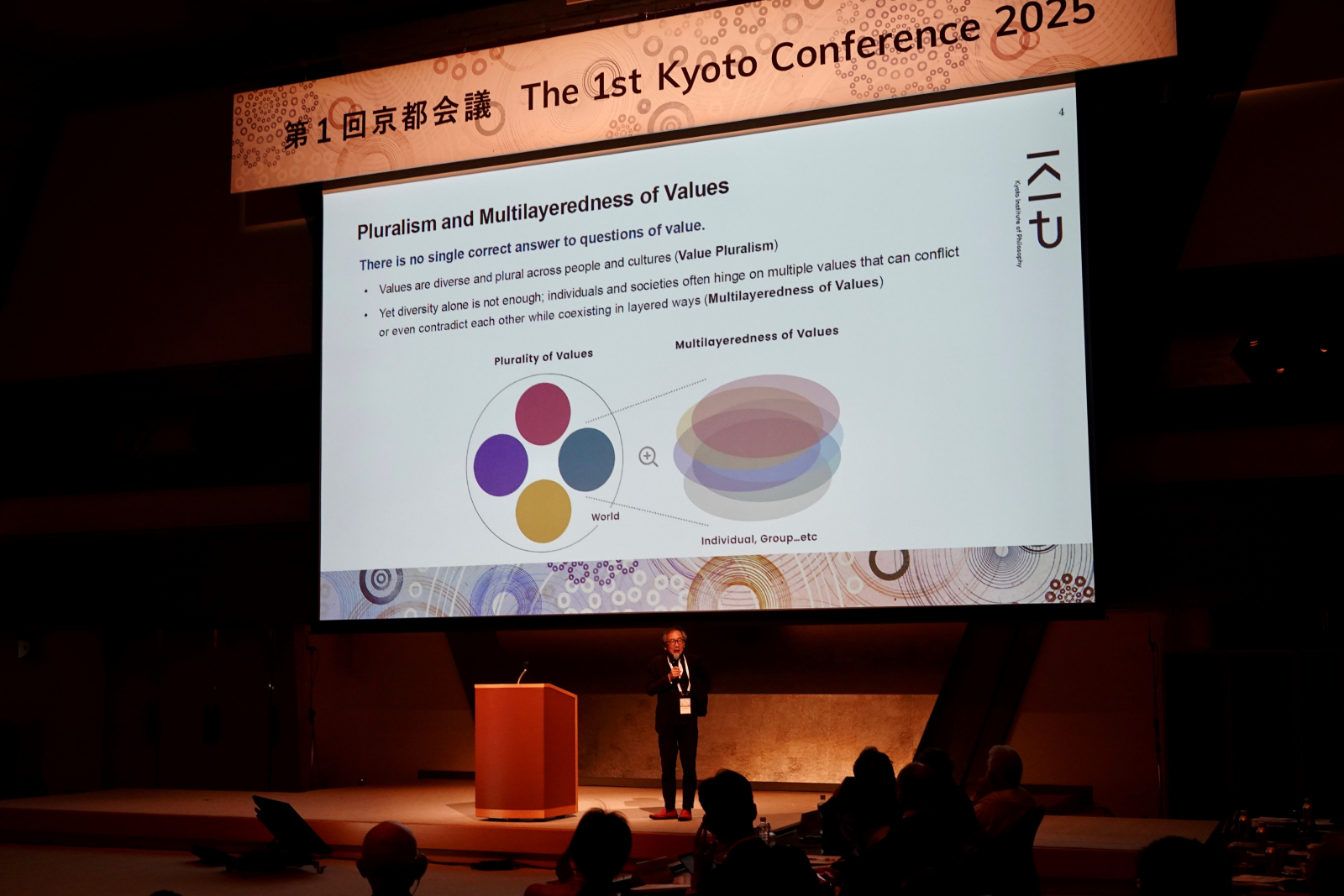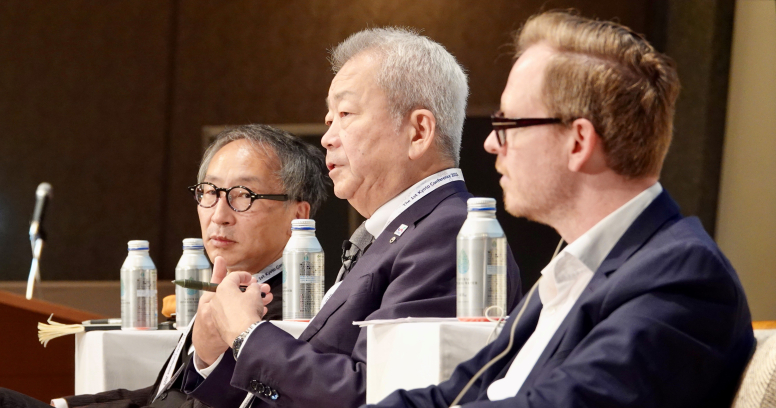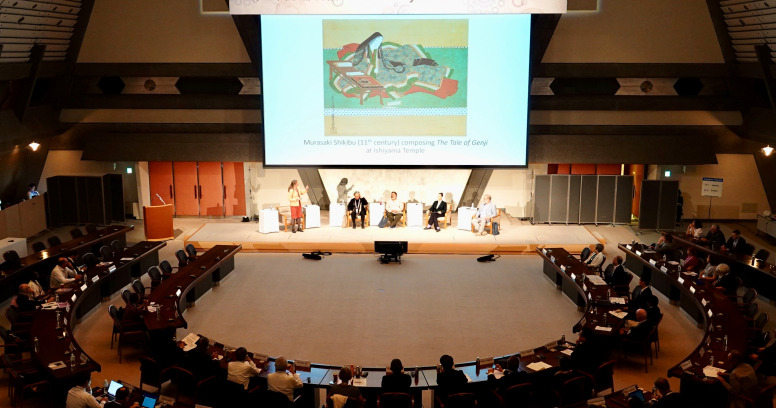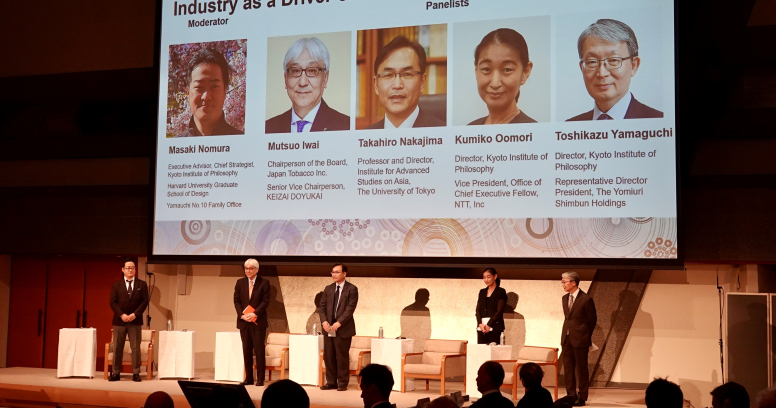Highlights from the Kyoto Conference 1: “Happiness” and “Goodness” are not self-evident — The multilayered nature of the “age of values”: Keynote lecture by Prof. Deguchi: Part 1

Bridging the divide between industry and academia, the Inaugural Kyoto Conference drew a total of about 600 participants from 18 countries over two days under the theme “Toward a Multilayered Society of Values.” Representatives from governments and municipalities, as well as diplomatic, religious and civic organizations also joined the event, which deepened philosophical reflections on “values” in an age of rapidly advancing AI. The following is a highlight of this pioneering endeavor.
Details
In the main hall of the Kyoto International Conference Center, the desks were arranged in concentric horseshoe shapes, forming concentric circles. At 9:00 a.m. on September 23, the Inaugural Kyoto Conference began with words of panoramic analysis.
“Leaders in industry have long urged their employees to change their mindset in a world of constant change and uncertainty. Yet changing one’s mindset is not easy, because without changing the deeper layer of values, consciousness itself cannot change. On the other hand, the academic community—especially in philosophy and the humanities—has not sufficiently engaged with industry or society for decades.”
These were the opening remarks by Jun Sawada, Co-chairperson of the Kyoto Institute of Philosophy and Executive Chairman of NTT, Inc. Sawada pointed out the high barriers faced by both industry and academia and continued by expressing his aspirations for the Kyoto Conference:
“That is why I hope this conference will create opportunities for open discussions across fields, and that together we will discover new values for the world.”
As the applause subsided, dignitaries representing Kyoto, the host city—such as Takatoshi Nishiwaki, Governor of Kyoto Prefecture—and Julia Longbottom, British Ambassador to Japan, delivered speeches in turn. Although their tones were calm, each conveyed a deep sense of urgency about the global challenges facing humanity today.
Governor Nishiwaki remarked:
“We face major social issues such as environmental problems, population decline, and geopolitical instability, all of which are intricately intertwined. Meanwhile, the pace of technological innovation is accelerating, and the impact of new technologies, including AI, on our society is growing day by day.”
Ambassador Longbottom stated:
“Today, we face a new set of challenges, especially those arising from new technologies like AI and quantum, as well as from new threats to security and from climate change. These stretch the limits of our ethical and rational frameworks and leave us with fundamental questions about what it means to be human, a business, a government, or a nation.”
Hopes were also voiced that the high-level, cross-sector dialogue at the conference would translate into concrete action. Petra Sigmund, German Ambassador to Japan, emphasized the importance of international solidarity:
“We need to reflect about the direction we want to take and how we can catalyze meaningful actions towards shaping a more desirable future for all.”
Professor Nagahiro Minato, President of Kyoto University, which co-organizedthe Kyoto Conference, also expressed his expectations:
“I hope this conference will offer clear directions and a hopeful vision to the international community as we strive to overcome an age of confusion and division.”
The Kyoto Institute of Philosophy positioned this conference as a “platform to explore fundamental questions about value.” The increasingly complex and interconnected challenges humanity faces today can no longer be solved by technical or policy approaches alone. To confront their roots, we must question the very direction in which humanity should proceed. “Values” are what we consider important, desirable and right that lie at the core of the question. To help participants grasp this philosophical foundation, the other Co-chairperson, Professor Yasuo Deguchi of Kyoto University, delivered a 20-minute keynote lecture. Standing before the large screen, he began slowly, tracing the paradoxes of modernity.
“In the 20th century, people believed that if science and technology advanced and the economy grew, we would become happier, society would improve, and war would disappear. We moved forward, step by step, with this conviction. However, it is now becoming clear to everyone that even with progress in science and technology and economic growth, people are not necessarily happier, society is not necessarily better, and wars continue unabated. At the same time, we are beginning to realize that fundamental questions—‘What is happiness?’ ‘What is a good society?’ and more broadly, ‘What is value?’—are not at all self-evident. The very notions of value and ideals have become elusive. Like the Blue Bird in the story of Tyltyl and Mytyl, their absence only heightens their presence. I believe we are now living in such a time: the century of values.”
What, then, is value? Professor Deguchi presented his own view as follows:
“I wish to follow the tradition of the Kyoto School of philosophy and consider value in relation to somatic action—the actions we perform with our living bodies. In other words, value is what our somatic actions aim to achieve. What you seek to attain through your actions is nothing other than value. Put differently, value functions as an arrow or a vector, giving a certain direction to our somatic actions. When everyone shares the same value, their actions align, making joint action possible for the first time. That is my understanding of value.”
In an interview previously published on the Institute’s website, he also noted:
“I believe that what has actually been uniting actions all along is value itself. Value is quite literally the vector that gives clear direction to our actions, and it’s the adhesive that enables joint action for humanity.”
This view naturally raises another question: If value provides direction, does a shared vector for humanity exist? Deguchi addressed this question in his lecture:
“I believe there is no single correct answer to this question. It is important that individuals and societies each have their own unique direction.”
He further pointed out that we must remain aware of “a multitude of different value-vectors, which may at times conflict with or contradict one another,” and emphasized that understanding such realities constitutes “not merely value diversity or pluralism, but the multilayeredness of values.” Value is not singular but multilayered. Recognizing and respecting this multilayeredness, Deguchi suggested, is essential for humanity moving forward.
“One of the missions of our Kyoto Institute of Philosophy is to affirm the multilayered nature of values. We aim to propose a diverse and layered set of values befitting this condition and to realize a multilayered society of values built upon them.”
— To be continued in Part 2 of the Highlights from Professor Deguchi’s Keynote Lecture.
Others



